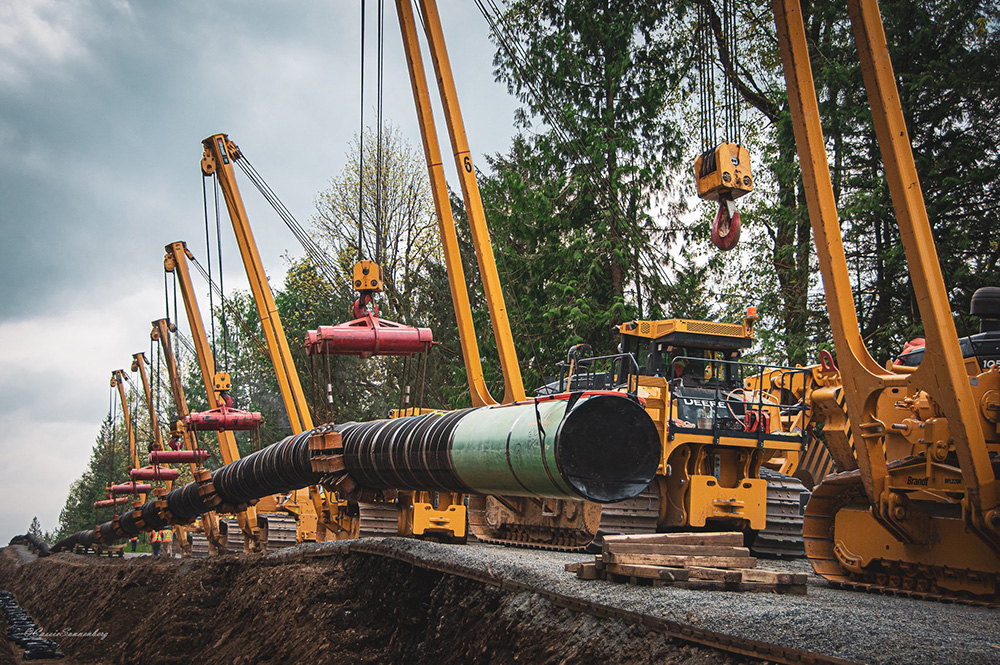The soaring cost of the Trans Mountain pipeline expansion has pushed the uncompleted megaproject Ottawa bought to satisfy Alberta further into the red, says a report released Wednesday by the parliamentary budget officer.
This quickly earned the project the uncomplimentary sobriquet “boondoggle” from Environmental Defence’s national climate program manager Julia Levin.
The Trudeau government decided in 2018 to buy the 70-year-old pipeline that runs 1,150 kilometres from Alberta to Burnaby, B.C., from Kinder Morgan Canada Ltd. It also took on the cost of tripling the pipeline’s capacity, which the company had first proposed in 2013.
It’s the only pipeline carrying Alberta’s petroleum products to the Pacific Coast, and Ottawa was clearly responding at the time both to pressure from the NDP provincial government of then-premier Rachel Notley and threats by Kinder Morgan Canada Ltd. to pull the plug on the project in the face of environmental and political opposition in British Columbia.
The charming belief prevalent then and now in Alberta was that, never mind the law of supply and demand, the expanded line would miraculously increase the price fetched by oilsands bitumen by getting it to new markets in Asia via pipeline and ocean tanker, an idea that inflamed the debate in B.C.
At the time of the federal decision to take over the project, the cost of the purchase was said to be $4.5 billion.
The short analysis report published Wednesday by the Office of Parliamentary Budget Officer Yves Giroux said the estimated cost of the massive construction budget for the project has surged from $12.6 billion when the office last looked at the project in 2020 to $21.4 billion now.
When Ottawa made the decision in 2018 to buy, expand, run and eventually sell off the pipeline to the private sector, the expansion project’s cost was estimated to be about $7.5 billion.
As a result of the soaring costs, the parliamentary budget office report by analysts Jason Stanton and Kaitlyn Vanderwees said, “Trans Mountain no longer continues to be a profitable undertaking” and will result in a net loss for the federal government.
A chart in the report shows the current value of the pipeline system is now estimated at negative $600 million.
What’s more, the report said, if Ottawa were to pull the plug on the TMX project at the end of this month and suspend it indefinitely, the Canadian government would have to write off more than $14 billion in assets.
“The net impact would result in a significant financial loss for the Government and would lead to the Trans Mountain Corp. no longer being a going concern,” the report said. The company is a subsidiary of Crown-owned Canada Development Investment Corp. that has operated the pipeline since Kinder Morgan was paid off and got the hell outta Dodge.
Well, no surprise there, really. The business plan on which the expansion project and subsequent federal purchase was based always seemed more than a little iffy, especially since it depended in large part on the notion that expanding the supply of diluted Alberta oilsands bitumen to Asia would cause the price fetched by the stuff to increase.
That’s not actually how the law of supply and demand, normally thought to be pretty ironclad, is supposed to work. Indeed, one would have thought that, as earth scientist David Hughes has been predicting since 2016, increasing supply might just do the opposite.
More than a little ironically, world oil prices are now way up — for the moment, at least — not because the Government of Canada has been building pipelines, but because Canada and other western nations have been trying to force Russia to shut pipelines down in response to its invasion of Ukraine.
This is another indication that the law of supply and demand still operates just as explained in economics textbooks.
Long-term contractual agreements with shippers that mean most of the growing costs of the expansion can’t be passed on to oil companies also impact the viability of the project.
All this said, the report does not present information that non-expert readers would need to reach their own conclusion about what Ottawa should do next.
“PBO requested updated projected future cash flows for the Trans Mountain Pipeline system from the Canada Development Investment Corp., the Crown corporation holding the Trans Mountain assets,” the report explains.
The Crown corporation, it said, “provided all requested information to PBO, but the information was classified as commercially confidential. The data’s confidentiality did not inhibit PBO’s work to model the data, assess the value of the Trans Mountain assets, or publish the analytical results in this report.”
In other words, we’ll just have to trust the PBO — a situation that provides the grounds for a lot of mischief by supporters of pipelines, no matter what.
As a result, the report requires a certain amount of reading between the lines to try to figure out which course of action — pumping or dumping — makes more sense in the long run.
Notwithstanding the PBO’s stated mission of helping Parliament “by providing economic and financial analysis for the purposes of raising the quality of parliamentary debate and promoting greater budget transparency and accountability,” nowhere in Wednesday’s report does it say explicitly that a write-off would be a more prudent course of action than continuing to operate what may well turn out to be a white elephant.
Without the data not available to the public, it’s hard to argue with Levin’s conclusion that “the Trans Mountain pipeline has become a financially dangerous boondoggle.”
“The government has often justified the pipeline by promising that its eventual profits will fund clean energy projects; this is flimsy logic given the disastrous climate and environmental impacts of the project,” she said in a news release. “The PBO update shows this argument doesn’t hold water: there will be no profits, only financial losses for Canadians and more carbon emissions for the planet.”
“As the costs of the project keep ballooning, the government should cut its losses and cancel construction of the expansion pipeline,” she concluded, “before even more of our dollars are wasted; public dollars that could be instead invested in developing sustainable energy systems.”
Prime Minister Justin Trudeau should have noticed by now that the only thing likely to earn him more abuse from Albertans than not giving them what they want is giving them what they want. But there’s still not much chance of his government killing the project.
Both the federal and Alberta governments signalled their determination Wednesday to keep working on the expansion project.
“The Trans Mountain Expansion project is in the national interest and will make Canada and the Canadian economy more sovereign and more resilient,” Adrienne Vaupshas, federal Finance Minister Chrystia Freeland’s press secretary, told the Canadian Press.
“This project is necessary for Alberta and Canada’s energy sectors,” Alberta Energy Minister Sonya Savage advised CBC News. ![]()
Read more: Energy, Federal Politics

















Tyee Commenting Guidelines
Comments that violate guidelines risk being deleted, and violations may result in a temporary or permanent user ban. Maintain the spirit of good conversation to stay in the discussion.
*Please note The Tyee is not a forum for spreading misinformation about COVID-19, denying its existence or minimizing its risk to public health.
Do:
Do not: